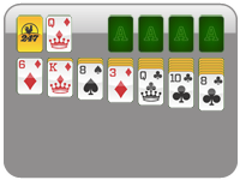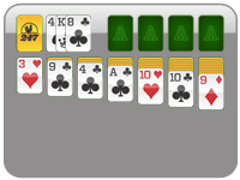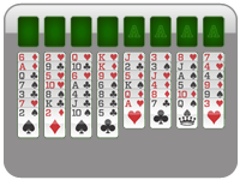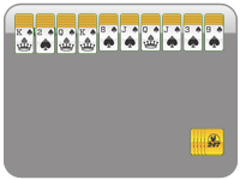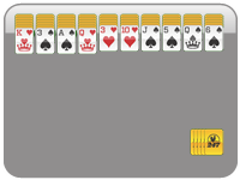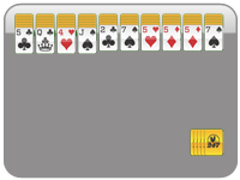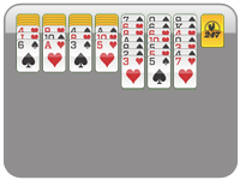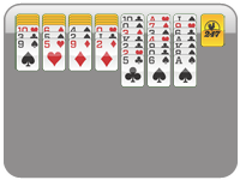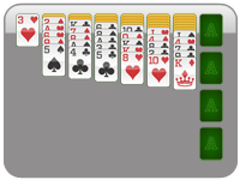Play Free Online Freecell Solitaire!
Welcome to 247 Freecell Solitaire, the best way to enjoy free Freecell Solitaire online! The minute you hit play, your tableau is set. Balance completing your foundations while strategically using your free cells to achieve success!
How to play Freecell Solitaire
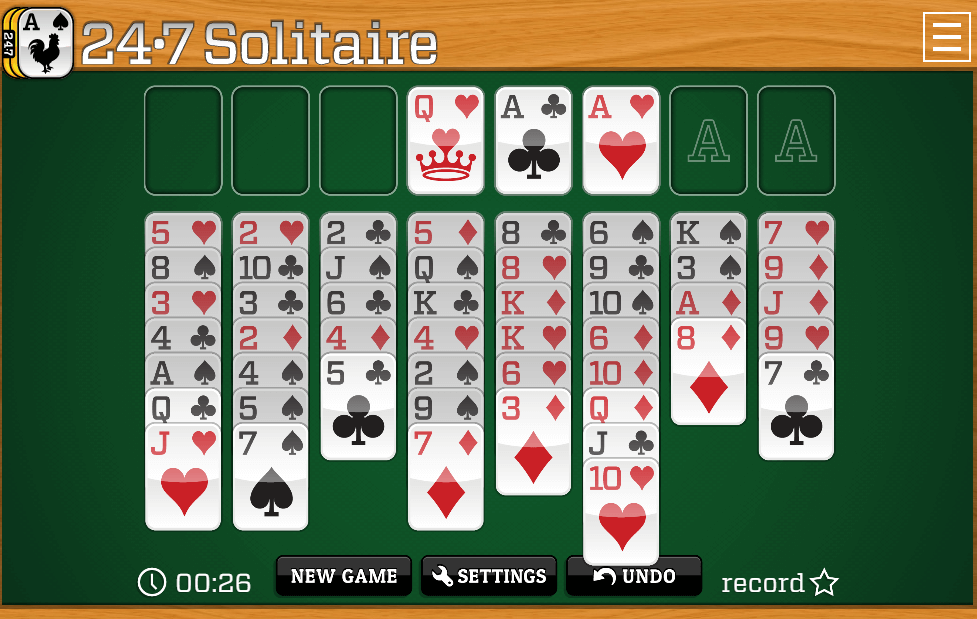
When you start, you’ll have eight stacks of cards: the first four stacks with seven cards and the last four with six. This is called your tableau, your area of play. You will be creating stacks in descending order, alternating colors. Unlike traditional Solitaire, all of the cards are face up and in play at the beginning of the game.
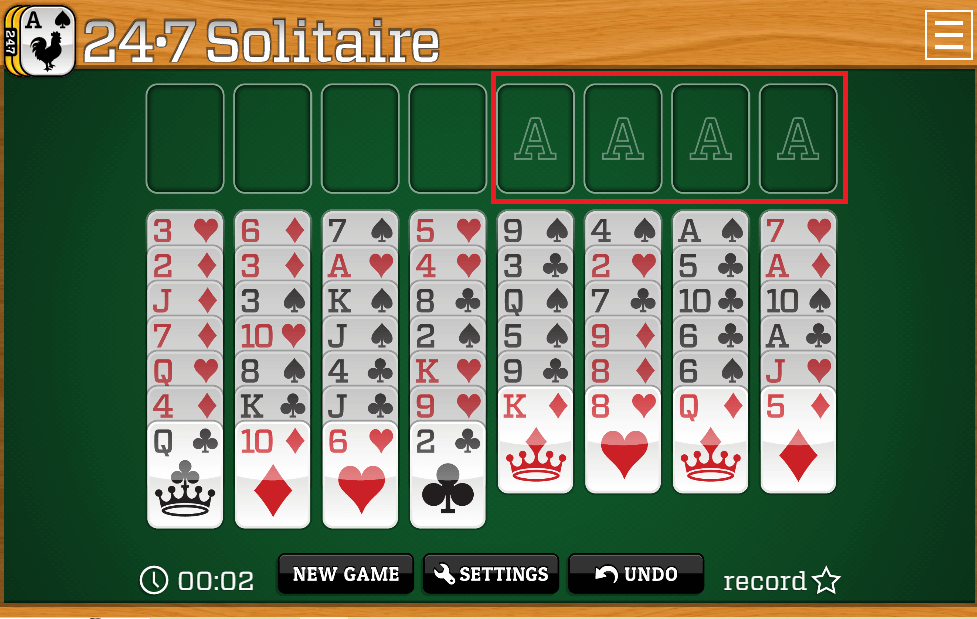
You will leave room for four foundation spaces. Foundations are where you’re going to stack cards from Ace to King for each suit—completing the foundations is the objective of the game. You must start with the Ace for each suit!
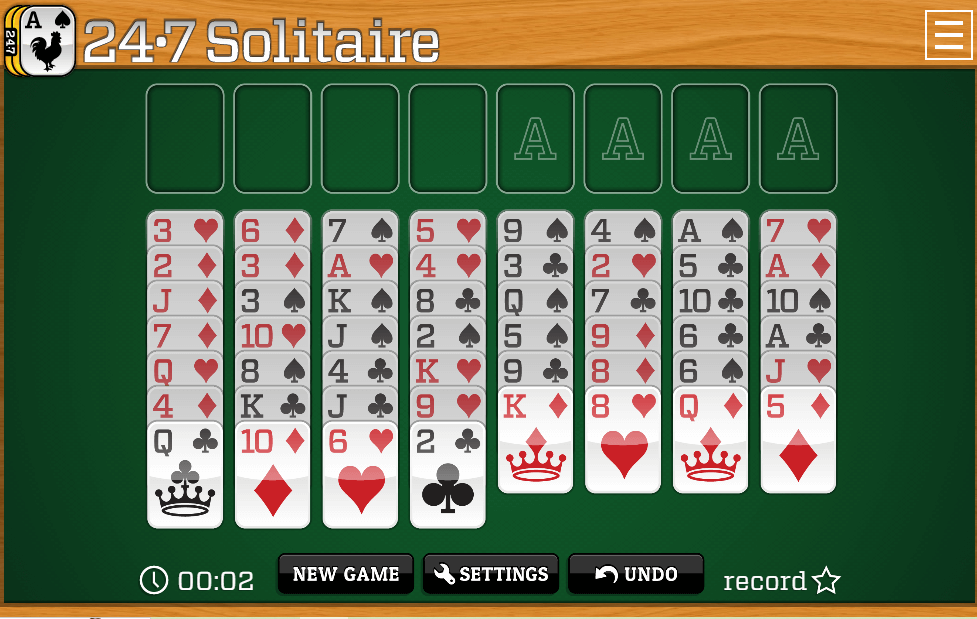
You’ll also have four freecells, spaces where you can place a single card for later play. This is a unique strategy and one that takes time to master!
However, there’s another key rule regarding free cells. Normally, you’re only able to move one card between columns at a time. With open free cells, though, you may move more cards, essentially an extra card per open free cell:
- With four open free cells, you may move five cards
- With three open free cells, you may move four cards
- With two open free cells, you may move three cards
- With one open free cell, you may move two cards
Moving big stacks of cards is what you’ll need in the late game, so keep freecells free as much as you can.
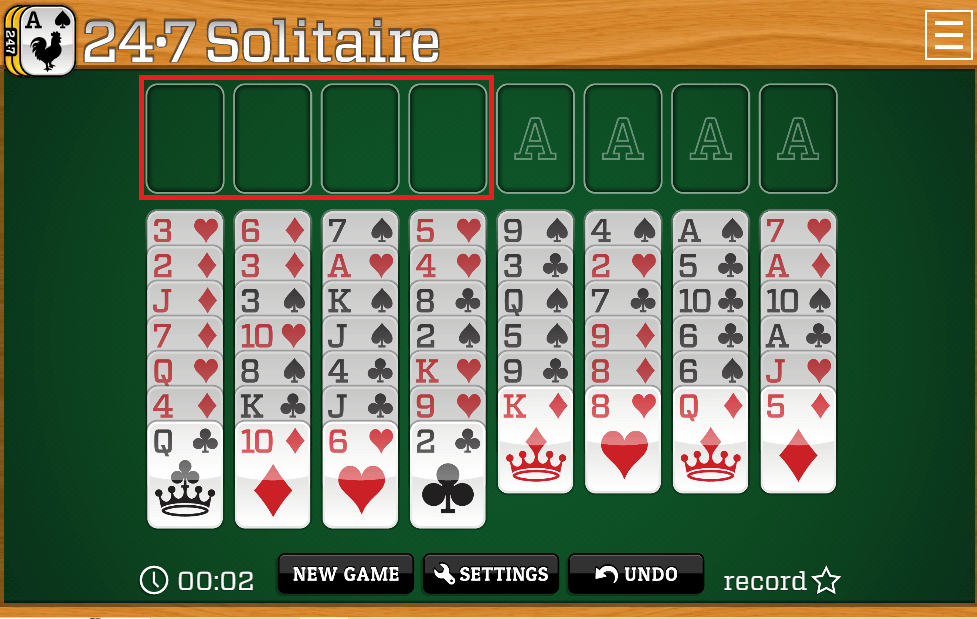
Classic Freecell Solitaire is a delicate balance of your free cells, your tableau, and your foundations. Prioritization is key, which is what we’ll cover below in strategy. Regardless, it’s good to try out a few games first to familiarize yourself!
Solitaire Games
Freecell Solitaire Strategy
The objective of classic Freecell Solitaire is to complete your foundations in ascending order, plain and simple. At the start of the game, make sure to analyze your tableau to identify where certain cards are and any problems you anticipate. Some moves may be obvious, but they may not be optimal given the grand scheme of things
Ideally, you want to get your aces out of the way first, since they’re the first card to place in your foundations. Depending on the draw, they may be buried deep behind other cards; if that’s the case, prioritize getting them out of the way ASAP. The same goes for twos, then threes, and onwards.
Freecells are places to store cards that block progression, but keeping them open gives you the benefit of moving more cards at a time. This means that while filling a free cell might help maneuver in the short term, you’re going to restrict yourself later if you fill them up too much. Only place cards in free cells if it’s your only option.
While arranging cards, you want to free up columns on your tableau the earliest you can. To these spaces, you can move entire stacks (depending on your open free cells, of course). When you complete a column, meaning it goes from King to Ace with no cards above, you may leave it alone for the rest of the game. Packed cards should more often than not be moved to a tableau column, not a free cell.
Freecell Solitaire is more complicated than many of its Solitaire counterparts, so don’t be discouraged if you do not understand the win conditions immediately. Practice makes perfect!
Freecell Solitaire FAQs
What’s the difference between Freecell and Solitaire card games?
Solitaire, what those outside the US and Canada refer to as Klondike, is pretty similar to Freecell. Both involve completing foundations, and both use a standard 52-card deck.
There are some key differences, though. First, obviously, Freecell Solitaire incorporates free cells, while Solitaire has a stockpile to draw cards from. Second, Freecell Solitaire has all cards revealed from the start, while Solitaire has many cards facedown that you must reveal before completing foundations. Last, the strategies for Freecell Solitaire are a lot more complex due to the balance of different spaces you’re trying to manage.
Can every Freecell Solitaire game be solved?
Unfortunately, no. No variation of Solitaire offers a 100% of winning—mathematicians estimate that only 80% of Solitaire games are winnable. Freecell Solitaire depends a lot on where cards are placed. Sometimes, Aces are buried with little way to root them out. Plus, an otherwise optimal play can make victory impossible. Luckily, if you get stuck, it’s easy to just start again from the top!
Is Freecell Solitaire considered difficult?
Freecell Solitaire is considered difficult compared to other Solitaire games due to the nature of free cells and the balancing act you need to perform to complete the game. However, some may think Freecell Solitaire is easier due to the fact that all cards are revealed from the start. Whatever the case, Freecell Solitaire involves a lot of focus and problem-solving skills, which may be difficult for anyone.
Is Freecell Solitaire good for the brain?
Yes! Like all Solitaire games, Freecell Solitaire offers a ton of mental stimulation through the act of observing, memorizing, and prioritizing plays. Studies have even shown that card games like Freecell Solitaire offer cognitive benefits that aid those suffering from cognitive decline, preserving their mental capabilities.
Where did Freecell Solitaire come From?
Solitaire games mostly emerged in the 18th and 19th centuries, but Freecell Solitaire entered the playing field around 1945 as a variant of the Scandinavian game “Napolean in St. Helena.” It was originally based on Baker’s Game, similar except that the tableau is built by suit. Like all Solitaire variants, Freecell Solitaire rose to global popularity during the genesis of personal computers.
More Solitaire Games
More Games
Solitaire News
Disclaimer
DISCLAIMER: The games on this website are using PLAY (fake) money. No payouts will be awarded, there are no "winnings", as all games represented by 247 Games LLC are free to play. Play strictly for fun.


